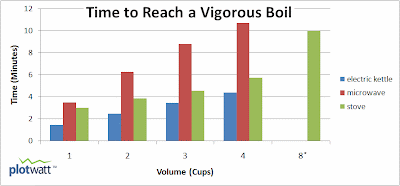Best Way to Boil Water

Posted by Luke Fishback

When it comes to home energy use, we often find that conventional wisdom is wrong, uselessly vague, or outdated. So, we recently set out to put a bit of experimental rigor into the question of making our morning cup of tea.
Here are some questions we wanted to answer:
- What’s the best (i.e. least energy intensive) way to boil water?
- Is the answer different for 1 cup of water vs. 4 cups? What about 2 quarts?
- Most importantly, if I’m doing it wrong, is it worth changing the way I do things already?
We carried out 13 tests on a typical microwave (1.3 kw), a popular electric stove (1.5 kw element), and a standard electric kettle (1.5 kw). The results were a bit surprising. The electric kettle (unsurprisingly) performed great. The microwave, on the other hand, was shockingly inefficient while the stove performed surprisingly well (considering all of the wasted heat it dumps into the kitchen).
Question 1: What’s the best way to boil water?
Answer: The electric kettle won hands down. The real advantage with the kettle is on the first cup. It boils in half the time as the first cup boiled in either the microwave or the stove. Since (at 1450 Watts) it uses about the same amount of power as the others, halving the time halves the energy. Thereafter, the energy requirement for boiling larger volumes of water is nicely predicted by a linear function. Each additional cup requires an additional 25 Watt-hours of energy and about a minute of additional time. The stove had similar performance except that the first cup required twice the energy (and time) of the kettle’s first cup.
Question 2: Does the answer change based on the volume of water boiled?
Answer: For the first quart of water, the answer is surprisingly unchanged. The only thing that really changes is that the microwave performance degrades much more rapidly than the other two. So, while the decision to boil one cup of water in the microwave isn’t much worse than using the stove top, using the microwave to heat up 4 cups of water is a bad choice (from the energy and time perspective).
Question 3: Is it worth changing my behavior?
Answer: In the grand scheme of home energy usage, it turns out the savings you could gain by changing your habits on this one aren’t huge. In fact, even if you boiled a quart of water every day, the cost difference between the best performer (the electric kettle) and the worst performer (the microwave) would only beabout $4 per year. But, what if we extend this lesson into other realms? We might consider reheating our soup in the kettle rather than the microwave or adding an electric kettle to the office kitchen for all of those cup-o-noodles (after all, the kettle is faster too). Furthermore, this is one of those rare energy decisions that can save time, money, and energy. Electric kettles are cheap, fast and efficient. Microwave ovens are expensive, slow and inefficient (for heating water).

The relative strength of the stove can also be seen as great news. If you size your pot appropriately the stove can almost rival the kettle… not bad.
*To heat 8 cups in the microwave or electric kettle would take two batches. You can therefore approximate the time (and energy) by doubling the time it takes for 4 cups. The savings are small enough though that you might as well just use the stove for volumes greater than your electric kettle capacity.